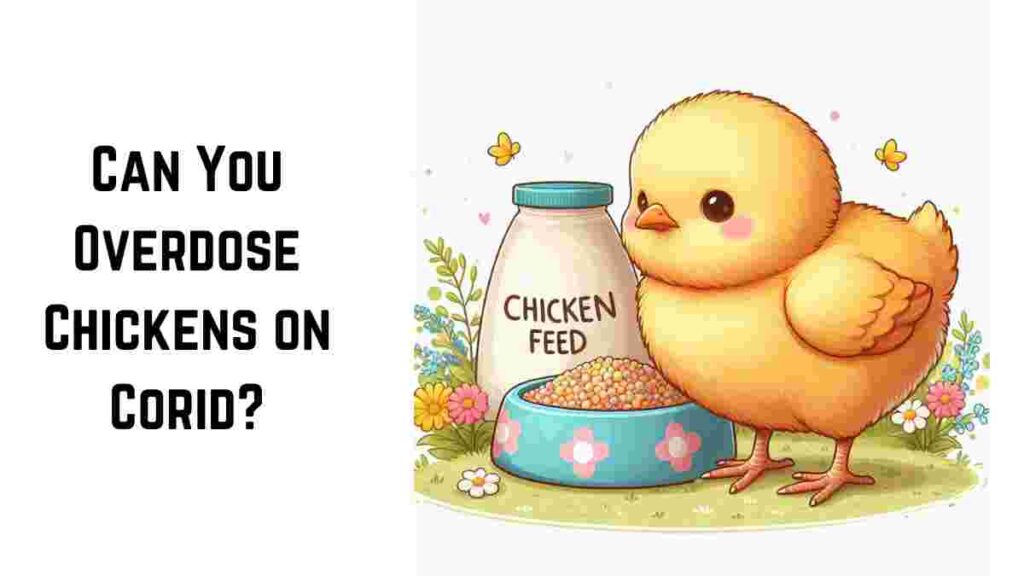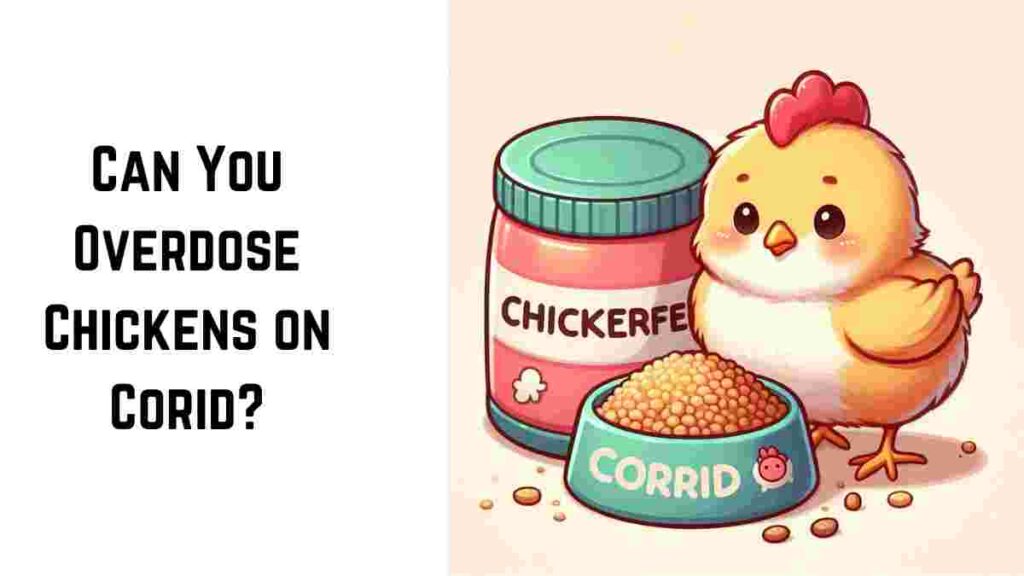Can You Overdose Chickens on Corid: Keeping chickens healthy is crucial for both small backyard flocks and large-scale poultry operations. Just like any other animals, chickens can fall ill, and one of the common illnesses they face is coccidiosis. To combat this, many poultry owners turn to medications like Corid.
But can you overdose chickens on Corid? Let’s dive into this topic and explore the importance of proper medication usage, the risks of overdosing, and how to ensure your chickens stay in tip-top shape.
Find the best food for your chickens

Table of Contents
Understanding Corid – Can You Overdose Chickens on Corid?
What is Corid?
Corid is a brand name for amprolium, a medication widely used to treat and prevent coccidiosis in chickens and other poultry. Coccidiosis is a parasitic disease of the intestinal tract caused by coccidia, which can lead to severe health problems and even death if not properly managed.
Active Ingredients in Corid
The active ingredient in Corid is amprolium. Amprolium works by inhibiting the ability of coccidia parasites to reproduce, effectively reducing their numbers and alleviating the symptoms of the disease.
Uses of Corid in Poultry
Treating Coccidiosis
Coccidiosis is a significant threat to poultry health, causing diarrhea, weight loss, and in severe cases, death. Corid is administered to treat infected chickens, helping to reduce the parasite load and allowing the birds to recover.
Preventative Measures
In addition to treatment, Corid can be used as a preventative measure, especially in young chicks who are particularly vulnerable to coccidiosis. By adding Corid to their drinking water, you can help protect them during their critical early weeks.
Dosage Recommendations
Standard Dosage Guidelines
The standard dosage of Corid for treating coccidiosis in chickens is typically 9.6% oral solution mixed in drinking water at a concentration of 10 ml per gallon of water for five to seven days. For prevention, a lower dose of 5 ml per gallon for five to seven days is usually recommended.
Administration Methods
Corid is most commonly administered through the drinking water, ensuring that all chickens in the flock receive the medication. It’s essential to provide clean, fresh water and to mix the solution thoroughly.

Symptoms of Overdosing Chickens on Corid
Physical Signs of Overdose
Overdosing chickens on Corid can lead to several physical symptoms, including lethargy, lack of appetite, and drooping wings. In severe cases, chickens might exhibit neurological signs such as tremors or imbalance.
Behavioral Changes
Behavioral changes such as excessive drinking, reduced movement, and general unresponsiveness can also indicate an overdose. Observing your chickens closely during treatment can help catch these signs early.
Short-Term Effects of Overdose
Immediate Health Impacts
In the short term, an overdose of Corid can cause acute health issues such as dehydration and electrolyte imbalance due to excessive drinking. These immediate effects need prompt attention to prevent further complications.
Recovery Possibilities
With quick intervention, chickens can recover from a Corid overdose. This typically involves stopping the medication and providing supportive care, such as electrolytes and clean water.
Long-Term Consequences of Overdose
Potential Chronic Issues
Chronic issues from repeated overdosing include damage to the kidneys and liver, which can affect the overall health and productivity of the chickens. Monitoring and maintaining proper dosage is crucial to avoid these long-term problems.
Impact on Overall Flock Health
An overdose can weaken the immune system of affected chickens, making them more susceptible to other diseases. This not only impacts individual birds but can also affect the overall health of the flock.
Preventing Corid Overdose
Proper Dosage Practices
Following the manufacturer’s instructions and consulting with a veterinarian can help prevent overdosing. Accurate measurement and adherence to guidelines are key to ensuring the safety and effectiveness of the treatment.
Regular Health Checks
Routine health checks and monitoring can help catch any signs of overdose early. Keeping detailed records of treatments and observations can aid in maintaining the health of your flock.
Alternative Treatments for Coccidiosis
Other Medications
Besides Corid, other medications like toltrazuril and sulfa drugs are available for treating coccidiosis. These alternatives might be used based on veterinary recommendations and specific flock needs.
Natural Remedies
Some poultry owners prefer natural remedies, such as adding apple cider vinegar or garlic to the water. While these methods can support overall health, they may not be as effective as pharmaceuticals in treating severe coccidiosis.
Balancing Medication and Natural Health
Integrating Corid with Natural Care
Integrating Corid with natural health practices can provide a balanced approach. This includes providing a nutritious diet, maintaining clean living conditions, and using natural supplements alongside conventional treatments.
Importance of a Balanced Diet
A balanced diet rich in vitamins and minerals supports the immune system, helping chickens resist infections and recover more quickly from illnesses like coccidiosis.
Veterinary Guidance and Support
When to Consult a Vet
Consulting a veterinarian is crucial when dealing with health issues in your flock. They can provide accurate diagnoses, recommend appropriate treatments, and offer guidance on proper dosage.
Importance of Professional Advice
Professional advice ensures that treatments are effective and safe. Veterinarians can also help manage any side effects or complications that arise during treatment.

Case Studies
Real-Life Examples of Overdosing
Several case studies highlight the dangers of overdosing chickens on Corid. In one instance, a flock owner miscalculated the dosage, leading to severe dehydration and mortality. Such examples underscore the importance of accurate dosing.
Lessons Learned
The key lesson from these cases is the necessity of following guidelines precisely and consulting with experts to prevent similar occurrences. Proper education and awareness can save your flock from avoidable harm.
Common Misconceptions About Corid
Myths vs. Facts
There are many misconceptions about Corid, such as the belief that more medication equals better treatment. In reality, overdosing can be harmful, and more is not always better when it comes to medication.
Addressing Misinformation
Educating poultry owners about the correct use of Corid and the risks of overdose can help dispel myths and promote better health practices within the community.
Best Practices for Using Corid
Safe Administration Tips
Always measure the medication accurately, mix it thoroughly with water, and ensure all chickens have access to the treated water. Avoid mixing Corid with other medications unless advised by a vet.
Monitoring Chicken Health
Regularly observe your chickens for any signs of illness or adverse reactions to the medication. Keeping a close eye on their behavior and physical condition can help catch issues early.
Conclusion – Can You Overdose Chickens on Corid?
In summary, while Corid is an effective treatment for coccidiosis in chickens, it is crucial to use it correctly to avoid the risks of overdose. Proper dosage, regular monitoring, and veterinary guidance are essential to ensure the health and well-being of your flock. By combining medication with good husbandry practices, you can keep your chickens healthy and thriving.
Frequently Asked Questions (FAQ) – Can You Overdose Chickens on Corid?
What is the safe dosage of Corid for chickens?
The safe dosage of Corid for chickens is 10 ml per gallon of water for treatment and 5 ml per gallon for prevention, typically administered for five to seven days.
How long should I treat my chickens with Corid?
Chickens should be treated with Corid for five to seven days, depending on the severity of the infection and veterinary advice.
Can Corid be mixed with other medications?
Corid should not be mixed with other medications unless recommended by a veterinarian, as this can cause adverse interactions.
What should I do if I suspect an overdose?
If you suspect an overdose, stop administering Corid immediately, provide clean water, and consult a veterinarian for further guidance.
Are there natural alternatives to Corid?
Yes, natural alternatives like apple cider vinegar and garlic can support chicken health, but they may not be as effective as Corid in treating severe coccidiosis. Always consult a vet for the best treatment plan.
